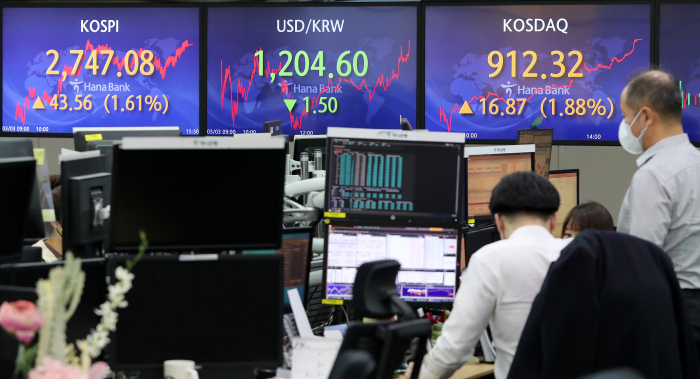S.Korea seen to benefit from MSCI's Russia removal
Analysts pick energy companies and stocks with low turnovers as likely beneficiaries
By Mar 03, 2022 (Gmt+09:00)
LG Chem to sell water filter business to Glenwood PE for $692 million


Kyobo Life poised to buy Japan’s SBI Group-owned savings bank


KT&G eyes overseas M&A after rejecting activist fund's offer


StockX in merger talks with Naver’s online reseller Kream


Mirae Asset to be named Korea Post’s core real estate fund operator



MSCI Inc.'s decision to remove Russian stocks from its emerging markets indexes from later next week stirred up expectations that as much as $3.4 billion in new investment money might find its way into the South Korean stock market.
The unprecedented decision comes after Russia stepped up its military attack on Ukraine, which reportedly has killed more than 2,000 Ukrainian civilians so far.
Russia made up 1.5% of MSIC emerging markets indexes, which are tracked by $1.8 trillion in global equity funds, including $1.4 trillion in active funds.
South Korean stock market analysts said the removal of Russian stocks would create additional room for South Korean stocks in the emerging markets indexes by 0.2 percentage points to 12.4%.
Based on the assumption, the additional money expected to flow into the South Korean stock market is reckoned at as much as $3.4 billion in both active and passive funds, according to some analysts.
The projected number could be lowered, if active funds do not closely track the global indexes, Samsung Securities analyst Kim Dong-young cautioned. MSCI had already cut the Russian weighting from its indexes by half to 1.5%, he added.
Nevertheless, Eugene Investment &Securities analyst Kang Song-cheol said the domestic stock market would enjoy additional inflow from global investors, following the MSCI's index reclassification.
STOCKS WITH LOW TURNOVERS, ENERGY STOCKS
Analysts picked stocks with low turnovers as likely beneficiaries of the upcoming change in the global indexes, which passive funds automatically track.
Among the stocks not actively traded, Shinhan Investment Corp. recommended preferred shares of Samsung Electronics Co., LG Chem Ltd. and Hyundai Motor Co.; KT&G Corp., a tobacco and ginseng company; Coway Co., a water purifier; Samsung SDS Co. and S-1 Corp., a securities service provider.
Large-cap stocks, including Samsung Electronics Co., will also likely see fresh money inflows from global funds. If additional money of up to 4 trillion won ($3.4 billion) is diverted to the South Korean stock market in line with the reshuffle of the global indexes, the country's largest stock Samsung Electronics is likely to see an influx of about 1.3 trillion won in new funds, or 30% of the total.
Hana Financial Investment analyst Lee Kyung-soo keeps an eye on energy stocks in the domestic market. Energy companies account for half of the Russian stock market, followed by materials stocks with a 23% stake and financial services with a 16% stake.
Lee said that about 12.7 trillion won that has been put into Russian energy stocks will be diverted into South Korean counterparts.
He projected a total of 520 billion won in new investment money will flock to domestic energy stocks such as SK Innovation Co., S-Oil Corp., GS Holdings Co. and Hyundai Heavy Industries Holdings Co. after Russia is removed from the MSCI Emerging Markets Indexes.
Another 550 billion won will likely go to materials stocks in South Korea, he said.
Write to Yoon-Sang Koh at kys@hankyung.com
Yeonhee Kim edited this article.
-

-
 MarketsMSCI adds SK Bioscience, SKIET, EcoPro BM to Korea Index
MarketsMSCI adds SK Bioscience, SKIET, EcoPro BM to Korea IndexAug 12, 2021 (Gmt+09:00)
2 Min read -
 MarketsShort-selling ban keeps Korea from making MSCI’s developed-markets index
MarketsShort-selling ban keeps Korea from making MSCI’s developed-markets indexJun 22, 2021 (Gmt+09:00)
3 Min read


